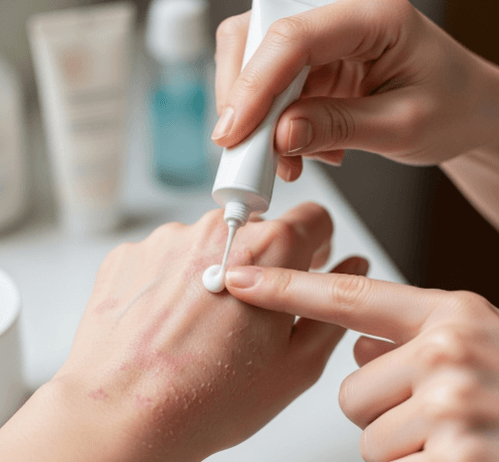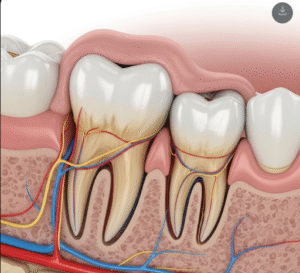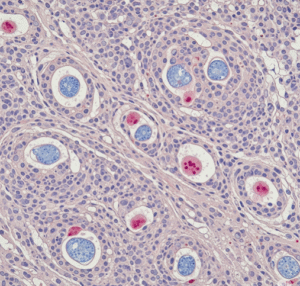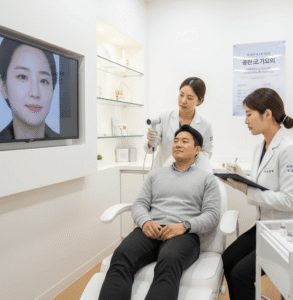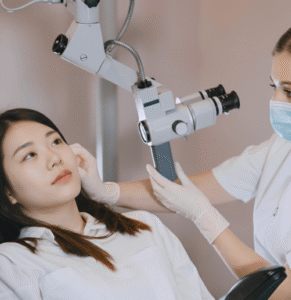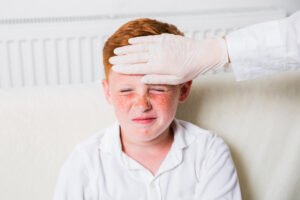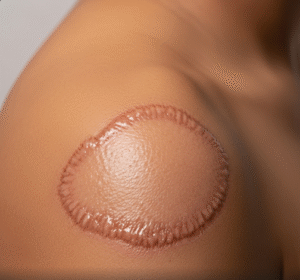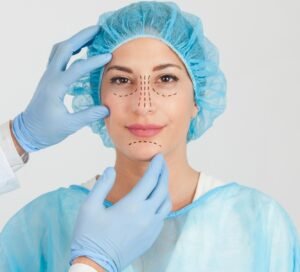➤ What it is
Eczema, also called atopic dermatitis, is a chronic inflammatory skin condition that causes redness, itching, dryness, and sometimes oozing or crusting of the skin. It is one of the most common skin disorders globally, affecting both children and adults.
The condition is linked to a combination of genetic, environmental, and immune system factors. The skin barrier in eczema patients is weaker, making it difficult to retain moisture and easier for allergens, irritants, and microbes to penetrate. This leads to cycles of flare-ups and remissions.
Eczema is not contagious, but it significantly affects quality of life. It may appear on the face, neck, arms, hands, behind the knees, and other areas, often worsening with stress, weather changes, or irritants.
In Korea, eczema management is highly advanced because of the country’s dermatology expertise, skin barrier science, and integration of medical care with cosmetic skincare treatments. Korean dermatologists focus not just on controlling inflammation but also on restoring skin health and appearance.
➤ Why it’s done
The goals of eczema management are multifaceted:
- Symptom Relief ⮕ Reduce itching, redness, and irritation.
- Barrier Restoration ⮕ Strengthen skin’s protective barrier to prevent future flare-ups.
- Prevent Infection ⮕ Damaged skin is prone to bacterial, fungal, or viral infections.
- Improve Quality of Life ⮕ Persistent eczema affects sleep, mood, and confidence.
- Cosmetic Outcome ⮕ Visible eczema patches can cause distress, so Korean clinics emphasize treatments that also improve skin tone and texture.
Without proper management, eczema can lead to chronic skin damage, thickened plaques (lichenification), scarring, and frequent secondary infections.
➤ Alternatives
There are multiple therapeutic strategies for eczema, ranging from medical to lifestyle-based approaches:
- Topical Treatments
- Corticosteroid creams/ointments → control inflammation during flares.
- Calcineurin inhibitors (tacrolimus, pimecrolimus) → steroid-sparing agents.
- Barrier creams and emollients → daily hydration to protect skin.
- Systemic Treatments
- Oral antihistamines → relieve itching.
- Immunosuppressants (cyclosporine, methotrexate, azathioprine) for severe cases.
- Biologics (e.g., dupilumab) → advanced targeted therapy for moderate-to-severe eczema.
- Phototherapy
- Controlled UV light therapy reduces inflammation and itching.
- Lifestyle and Natural Approaches
- Avoiding known triggers (allergens, irritants, stress).
- Dietary modifications if food sensitivities are identified.
- Stress-reduction practices like meditation.
- Korean Skin Care Options
- Soothing facials, herbal packs, and barrier-repair programs in dermatology clinics.
- Use of gentle, hypoallergenic Korean skincare products with ceramides, hyaluronic acid, and botanical extracts.
➤ Preparation
Before starting eczema management, preparation is crucial for accurate diagnosis and effective treatment:
- Dermatology Evaluation
- Full skin examination.
- Possible patch testing to identify allergens.
- Review of medical and family history (eczema, asthma, allergies often run together).
- Patient Education
- Understanding eczema triggers (weather, soaps, detergents, dust, stress).
- Learning correct use of topical medications.
- Skin Conditioning
- Moisturizing the skin daily before therapy begins.
- Avoiding harsh cleansers or scrubs.
- In Korea, many clinics start patients on pre-treatment soothing skincare such as cooling masks and hydration therapies to calm active inflammation before initiating medical treatment.
➤ How it’s Done
Eczema management is rarely a single procedure — it’s a multi-layered strategy.
1. Daily Skin Care Regimen
- Use of gentle, non-foaming cleansers.
- Frequent application of moisturizers (ointments or creams are preferred over lotions).
- In Korea, dermatologists often prescribe ceramide-rich Korean products specifically designed for barrier repair.
2. Medical Therapies
- Topical corticosteroids during flare-ups.
- Calcineurin inhibitors for sensitive areas like the face and eyelids.
- Biologics (dupilumab) for severe, resistant eczema.
3. Phototherapy
- Narrow-band UVB therapy under medical supervision.
- Reduces inflammation, itching, and bacterial colonization.
4. Korean Dermatology Practices
- Soothing facials with herbal extracts to calm inflammation.
- LED light therapy to reduce redness and accelerate healing.
- Specialized eczema spa programs that blend medical treatments with gentle skin care.
5. Lifestyle Integration
- Trigger avoidance (wool clothing, hot showers, certain foods).
- Stress management, as emotional stress is a major flare trigger.
➤ Recovery
Unlike other skin conditions, eczema management is long-term. Recovery refers to achieving remission periods where the skin is clear and flare-free.
- Short-term recovery:
- Flare-ups calm down within days to weeks with proper treatment.
- Skin becomes less itchy, less red, and smoother.
- Long-term recovery:
- Requires consistent moisturizing, sun protection, and lifestyle adjustments.
- Periodic dermatologist visits are necessary to monitor progress.
Korean Recovery Methods:
- After flare control, clinics often use skin barrier repair therapies, including hydration drips, gentle exfoliation, and strengthening facials.
- Patients are usually given a personalized skincare plan with approved Korean dermatology products for maintenance.
➤ Complications
If eczema is not well managed, several complications may arise:
- Skin Infections → open sores can allow bacteria, viruses (like herpes), or fungi to invade.
- Chronic Skin Changes → thickened, leathery patches (lichenification).
- Pigmentation Issues → post-inflammatory hyperpigmentation or hypopigmentation.
- Sleep and Mental Health Issues → chronic itching disrupts rest and may cause anxiety or depression.
- Allergic Progression → eczema is part of the “atopic triad” with asthma and hay fever; poorly managed eczema may coincide with worsening allergies.
In Korea, complication prevention is prioritized with regular follow-up visits, early interventions, and combined medical-aesthetic programs.
➤ Treatment Options in Korea
Korea offers some of the most advanced and patient-friendly eczema management options worldwide.
Why Korea?
- Cutting-edge research on skin barrier function.
- Advanced biologic therapies integrated into routine dermatology.
- Holistic programs that combine medical treatment with skincare maintenance.
- Medical tourism focus — international patients often visit Korean dermatology clinics for eczema care.
Unique Korean Approaches:
- Photodynamic and LED therapies adapted for inflammatory conditions.
- Barrier-repair facials using ceramides and hyaluronic acid.
- Customized K-beauty regimens designed under dermatologist supervision.
- Integrated care systems: patients may see dermatologists, allergists, and nutritionists under one program.
Korean Philosophy in Eczema Care:
- Prevention and long-term maintenance are equally important as acute treatment.
- Every plan is personalized, often combining topical, systemic, and skincare-based approaches.
- Treatments are designed not only to reduce disease but also to enhance skin’s beauty and resilience.
✨ Final Thoughts
Eczema Management in Korea is a comprehensive, long-term strategy that combines medical dermatology, advanced therapies, and skincare science. By focusing on both health outcomes and cosmetic results, Korea provides one of the most holistic and effective eczema care systems in the world.
From biologic treatments and phototherapy to gentle facials and barrier-repair regimens, Korea’s approach ensures patients achieve symptom control, skin restoration, and confidence in their appearance.
With early intervention, consistent follow-up, and emphasis on skin health as beauty, Korea is a global leader in eczema management.

